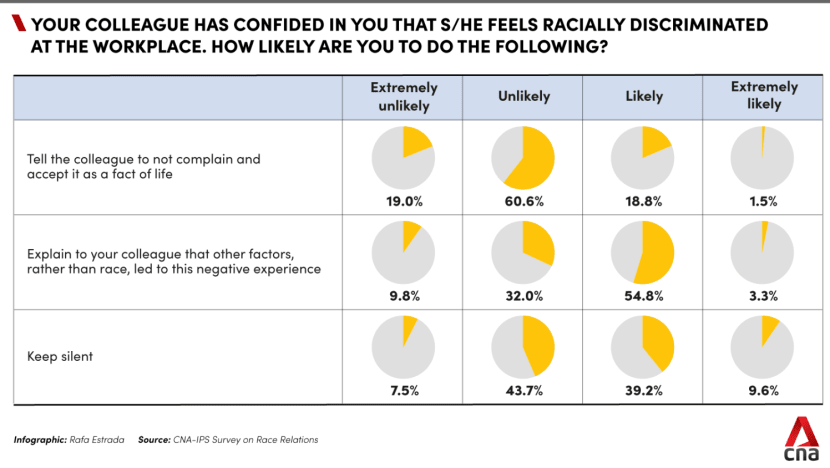Stricter laws against workplace discrimination long overdue, say Singapore residents in CNA-IPS survey

People seen at the central business district in Singapore on Mar 29, 2022. (Photo: CNA/Marcus Mark Ramos)
SINGAPORE: The majority of Singapore residents believe that strengthening the country’s legal system to prevent workplace discrimination is long overdue, according to a survey on race relations conducted by CNA and the Institute of Policy Studies (IPS).
Nearly 70 per cent of the survey’s more than 2,000 respondents agreed or strongly agreed with the statement, with 88 per cent believing that the law will be effective in reducing workplace discrimination in Singapore.
Conducted last year, the survey polled citizens and permanent residents aged 21 and above with a sample that was reflective of the population in terms of age, gender, race and housing types. An additional 350 or so Malays and Indians were surveyed so that their views were properly represented.
RACIAL DISCRIMINATION IN THE WORKPLACE
According to the survey, less than 9 per cent of respondents faced racial discrimination at work, with ethnic minorities more affected than Chinese.
This includes losing out on a job, promotion or opportunity at work, as well as being paid less than their counterparts of similar ability or rank.
A higher proportion of Malay (19 to 21 per cent) and Indian respondents (14 to 19 per cent) felt that they had been treated unfairly at work, compared to Chinese respondents (4 to 6 per cent).
However, when it comes to reporting racial discrimination, nearly half of the respondents (49 per cent) said they would choose to stay silent.
That was despite survey findings showing that 79 per cent would be likely to inform human resources or senior management if a colleague confided about being racially discriminated in the workplace.

RACIAL PREFERENCES IN WORK ROLES
The survey also found that while respondents of all races were generally accepting of bosses, colleagues and subordinates of any race – as long as they were Singaporean – Chinese respondents had a lower preference for having a Malay or Indian boss.
About 80 per cent or more of Chinese respondents said they would be fine with Malay or Indian colleagues or subordinates, but a lower percentage (71.1 per cent) said they would want them as bosses.
This did not appear to be the case for minority respondents, who had similar proportions when it came to Chinese bosses or bosses of their own race.
However, survey findings seem to suggest that minorities prefer Chinese bosses to bosses of another minority race.
While 89.3 per cent of all Malay respondents said they would accept a Chinese boss, only 78.4 per cent were fine with an Indian one. Likewise, 88.5 per cent of Indian respondents were accepting of a Chinese boss, but a lower proportion of 79.5 per cent said they would accept a Malay one.

















